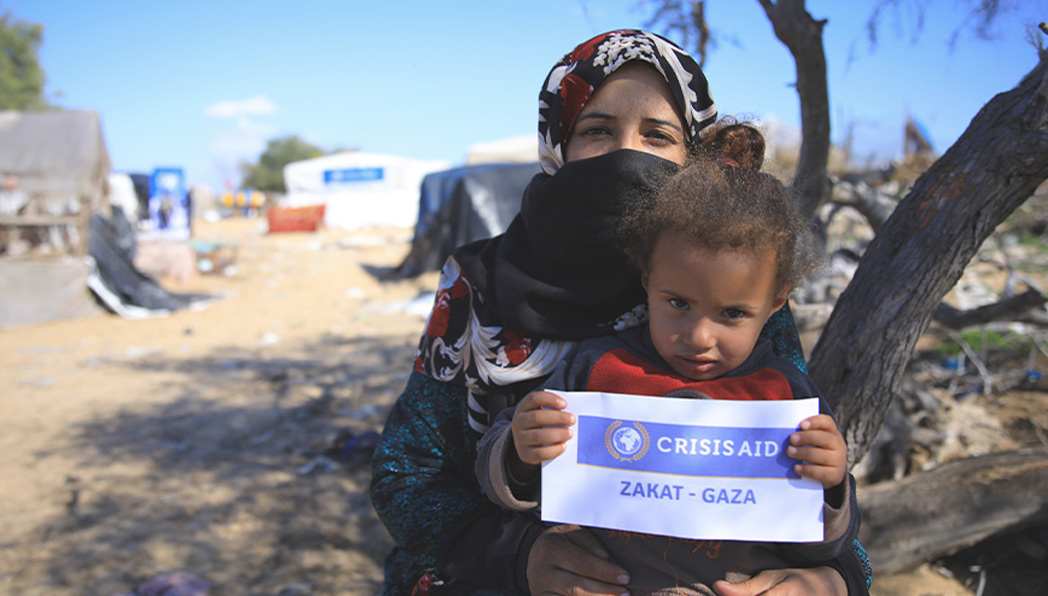Give your Zakat
Enter your donation

DONATE ZAKAT (ZAKAH)
In Arabic, Zakah means growth, blessing, and purification—values that enrich both the giver and the receiver. (Lisan al-‘Arab, 14/358; 2/399)
Zakah is more than charity—it is an act of worship. It is our duty to give a portion of what Allah has entrusted to us, helping those in need, as guided by the principles of Shari'ah.
As one of the Five Pillars of Islam, Zakah holds the power to ease the suffering of millions. At Crisis Aid, your Zakah donations provide vital support to some of the world’s most vulnerable communities. Through your generosity, you offer not just immediate relief but also hope for a future where these communities can one day give Zakah, rather than receive it.
Donate Your Zakat
Zakat Calculator
Frequently asked questions
Zakat is an obligatory form of charity that every eligible Muslim must give, amounting to 2.5% of their accumulated wealth over the course of a year. It is one of the five pillars of Islam and serves to purify wealth while helping those in need.
Zakat plays a vital role in supporting the poor, the needy, orphans, widows, and those struggling in hardship. At Crisis Aid, we ensure that Zakat donations are distributed strictly according to Islamic guidelines to provide essential aid where it is needed most.
Zakat must be given to specific groups of people as outlined in the Quran (Surah At-Tawbah, 9:60). These include:
- The Poor – Those who have little or no means to sustain themselves.
- The Needy – Those who may have some means but still struggle financially.
- Zakat Administrators – Those responsible for collecting and distributing Zakat.
- New Muslims – Those who have recently accepted Islam and require support.
- Slaves and Captives – To help free them from bondage.
- Debtors – Those in financial difficulty due to unavoidable debt.
- For the Cause of Allah – Includes charitable work, relief efforts, and those striving in the path of Allah.
- Stranded Travellers – Those unable to complete their journey due to financial hardship.
At Crisis Aid, we strictly adhere to these guidelines to ensure your Zakat reaches those truly in need.
Zakat is calculated as 2.5% of your total qualifying wealth that has remained above the Nisab threshold for a full Islamic year. Qualifying wealth includes:
✅ Cash (in hand, bank, or savings)
✅ Gold and silver (jewellery or bullion)
✅ Business profits and stock
✅ Investments (shares, rental income, etc.)
✅ Crops, fruits, trade goods and livestock
Nisab threshold:
- Based on gold, it is 87.48g of gold or its monetary equivalent.
- Based on silver, it is 612.36g of silver or its monetary equivalent.
To simplify your calculation, Crisis Aid provides a Zakat Calculator on our website to help you determine how much you need to give.
Yes, you can pay Zakat in instalments throughout the year as long as the full amount is paid before your Zakat due date.
Many people choose to give their Zakat during Ramadan for increased rewards, but it can be paid at any time once the full Islamic year has passed since your wealth reached the Nisab level. Crisis Aid accepts Zakat donations year-round, ensuring timely distribution to those in need.
Zakat can be given to eligible relatives, such as poor siblings, uncles, aunts, and distant family members, as long as they qualify under the categories of Zakat recipients.
However, you cannot give Zakat to:
❌ Your parents or grandparents (direct ascendants)
❌ Your children or grandchildren (direct descendants)
❌ Your spouse
If you wish to give Sadaqah (voluntary charity) to family members instead, Crisis Aid also facilitates non-Zakat donations to support loved ones in need.
At Crisis Aid, we ensure Zakat is distributed strictly in accordance with Islamic guidelines. Zakat is primarily given in the form of cash to eligible recipients, allowing them to meet their essential needs.
However, in certain exceptional cases—such as war zones, famine-stricken areas, or where access to markets is limited—Zakat may be provided in the form of essential food supplies to sustain those in desperate need. This method follows scholarly opinions that permit food distribution in situations where direct cash aid is not practical or feasible.
Crisis Aid prioritises areas where Zakat can have the greatest impact, supporting those in poverty, refugees, orphans, and displaced families while ensuring transparency in its collection and distribution.
How do I donate my Zakat to Crisis Aid
The Prophet (peace and blessings of Allah be upon him) said: “Every man will be in the shade of his charity on the Day of Resurrection.”
Classed as saheeh by al-Albaani in Saheeh al-Jaami’ (4510)
